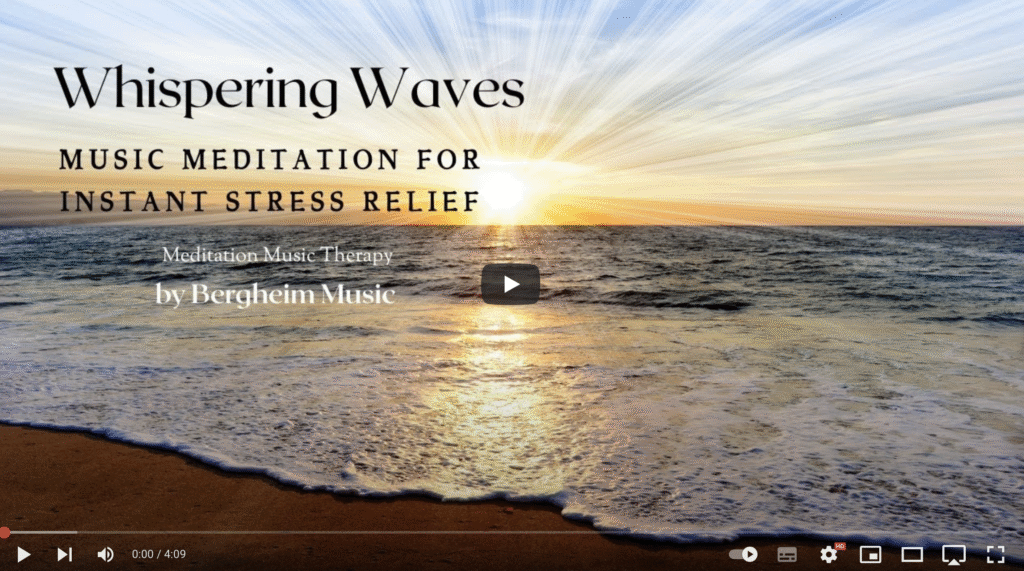
Sometimes we find life overwhelming. We all know the strain of deadlines, traffic jams, and endless to-do lists. But there is a simple, accessible tool that could help you find calm in the chaos. Enter the wonderful world of music therapy and meditation.
Music is both entertainment and medicine for the soul. And when combined with meditation practices, it becomes a powerful weapon against stress and anxiety.

The Science Behind Music’s Healing Power
You’re not imagining it when that favorite song of yours instantly lifts your mood or when soft piano melodies help you unwind. Research backs up what we intuitively feel about music’s impact on well-being.
Studies reveal some pretty amazing facts about music and stress relief. You will find references below this article.
- Listening to calming music can reduce cortisol levels by up to 61% – cortisol is your body’s main stress hormone
- A whopping 89% of people report that music significantly helps them reduce stress
- Music around 60 beats per minute can cause your brain to sync with the beat, creating alpha brainwaves associated with relaxation
- Participants in controlled studies experienced a 23% decrease in stress levels after listening to soothing sounds

This magic happens because music affects multiple systems in your body at once. It influences your autonomic nervous system (which controls things like heart rate and breathing) and your endocrine system (which manages hormones like cortisol). When you listen to calming music, your heart rate slows down, your blood pressure drops, and the stress hormones take a backseat.
Faster music can make you feel more alert and positive. Slower tempos quiet your mind down and relax your muscles.
What Is Music Meditation?
Music meditation combines the ancient practice of mindfulness with the therapeutic power of sound. Unlike traditional silent meditation, music meditation uses carefully selected sounds as a focal point for your attention.
This is how it works: instead of focusing on your breath or a mantra, you’re using music as your anchor. The melodies, rhythms, and tones guide you into a peaceful state of mind. You’re not just passively listening – you’re actively merging with the music while staying present and aware.Music meditation creates your sphere of tranquility: it’s just you and the sounds creating your own peaceful sanctuary.

Benefits That Go Beyond Relaxation
Music meditation offers benefits for both your mind and body:
- Stress and Anxiety Relief: The most obvious benefit, but worth emphasizing. Regular music meditation can help you develop better coping mechanisms for daily stressors.
- Improved Focus: Instrumental tracks can help quiet mental chatter, making it easier to concentrate during meditation and throughout your day.
- Better Sleep Quality: Soothing soundscapes help your body transition into rest mode, supporting both falling asleep and staying asleep.
- Enhanced Productivity: When you’re relaxed and focused, you naturally work more efficiently.
- Emotional Balance: Music helps process and release emotions, providing a healthy outlet for feelings that might otherwise build up as stress.Physical Benefits: Lower heart rate, reduced blood pressure, and decreased muscle tension.
The Best Music Styles for Stress Relief and Meditation
Not all music is created equal when it comes to relaxation. Here are the top genres that research and practitioners swear by:
- Classical Music: The gold standard for relaxation. Composers like Debussy, Mozart, and Bach created timeless pieces that naturally soothe the nervous system. “Clair de Lune” and similar slow, melodic pieces are particularly effective. Classical music transmits high energetic vibrations and has been shown to combat stress while enhancing creativity.
- Nature Sounds: Rain, ocean waves, flowing streams, and bird songs connect us with our natural environment. These sounds release endorphins and help eliminate the stress of daily life. They’re perfect for creating this “escape to nature” feeling, even in your living room.
- Instrumental and Ambient Music: Music without lyrics lets your mind focus on pure sound without getting distracted by words or stories. Ambient, jazz instrumentals, or instrumental versions of familiar songs work beautifully.
- Meditation-Specific Music: Designed specifically for mindfulness practices, this genre features repetitive patterns, slow rhythms, and minimal instrumentation. It often incorporates elements like Tibetan singing bowls or soft synthesized tones.
- Binaural Beats: These use specific sound frequencies to influence brainwave activity. Different frequencies can promote relaxation, focus, or sleep. This may sound a bit sci-fi, but the science is solid.

5 Simple Steps to Listen to Music for Stress Relief
Now, get ready to harness music’s healing power! Here are some simple steps to musical stress relief:
- Step 1: Create Your Sacred Space
Find a quiet spot where you won’t be interrupted. This doesn’t need to be fancy – a comfortable chair, your bed, or even a quiet corner will do. Dim the lights if possible and put away your phone. The goal is to signal to your brain that it’s time to relax.
- Step 2: Choose Your Musical Medicine
Select music that resonates with your current needs. Feeling anxious? Try gentle classical pieces or nature sounds. Mind racing? Opt for ambient music or binaural beats. Trust your instincts – your body often knows what it needs.
- Step 3: Get Comfortable and Set Your Intention
Sit or lie down in a position that feels natural. Close your eyes and take three deep breaths. Set a simple intention like “I’m allowing myself to relax” or “I’m releasing the stress from my day.” This mental preparation helps maximize the benefits.
- Step 4: Listen Actively, Not Passively
Instead of just having music play in the background, engage with it mindfully. Notice the different instruments, follow the melody, or focus on how the music makes your body feel. When your mind wanders (and it will), gently bring your attention back to the sounds.
- Step 5: Transition Mindfully
When done, don’t just jump straight back into your busy day. When the music ends, take a moment to notice how you feel. Stretch gently, take a few more deep breaths, and carry that sense of calm with you. Even five minutes of this practice can make a difference.

Making It Work for Your Lifestyle
The beauty of music meditation is in its flexibility. You can practice it during your morning routine, during your lunch break, or as an evening wind-down ritual. Begin with 5-10 minutes and gradually increase the time when listening becomes a habit.
Remember, there’s no “perfect” way to do this. Some days you might prefer energizing classical pieces; other days you’ll crave gentle rainfall sounds. Your musical taste is personal, and your stress-relief playlist should reflect you.
The key is consistency. Even just a few minutes of mindful music listening can transform your entire day: giving yourself permission to pause and listen might be the most radical act of self-care you can undertake.
So put on your headphones, press play, and let the music guide you back to your inner self. Your stressed-out mind will thank you for it.
Listen to our Serenity Music for inspiration and stress relief:

References
Click here to view the listof references
Research Studies and Articles
The Effect of Music on the Human Stress Response – PMC
- URL: https://pmc.ncbi.nlm.nih.gov/articles/PMC3734071/
- Published: 2013
- Source: National Center for Biotechnology Information (NCBI)
Music listening and stress recovery in healthy individuals
- URL: https://pmc.ncbi.nlm.nih.gov/articles/PMC9205498/
- Published: June 17, 2022
- Source: National Center for Biotechnology Information (NCBI)
Releasing Stress Through the Power of Music
- URL: https://www.unr.edu/counseling/virtual-relaxation-room/releasing-stress-through-the-power-of-music
- Source: University of Nevada, Reno – Counseling Services
How Music Can Reduce Stress and Improve Mental Health
- URL: https://www.harmonyandhealing.org/how-music-can-reduce-stress/
- Published: August 26, 2024
- Source: Harmony and Healing
How Does Listening to Music Help Relieve Stress?
- URL: https://neuvanalife.com/blogs/blog/how-does-listening-to-music-help-relieve-stress
- Source: Neuvana Life
Mental Health and Meditation Resources
Can you meditate with music? How to practice…
- URL: https://www.calm.com/blog/can-you-meditate-with-music
- Published: February 8, 2024
- Source: Calm (meditation app)
How to Practice Music Meditation
- URL: https://www.verywellmind.com/how-to-practice-music-meditation-3144791
- Published: January 22, 2024
- Source: Verywell Mind
Top 10 Meditation Music for Stress Relief
- URL: https://nkbmeditation.org/blog/top-10-meditation-music-for-stress-relief
- Published: January 24, 2025
- Source: NKB Meditation
The Science Behind Meditation Music and Its Positive Impact on Mental Health
- URL: https://worldhealth.net/news/meditation-music-and-impact-on-mental-health/
- Published: Januaryy 27, 2025
- Source: World Health
Meditation Music: 10 Types of Meditation Music To Listen To
- URL: https://declutterthemind.com/blog/meditation-music
- Published: January 16, 2025
- Source: Declutter Thee Mind
9 Best Types of Music for Meditation and Yoga Classes
- URL: https://meditationmusiclibrary.com/blogs/wednesday-wisdom-blog/9-best-types-of-music-for-meditation-and-yoga-classes
- Source: Meditation Music Library

Leave a Reply